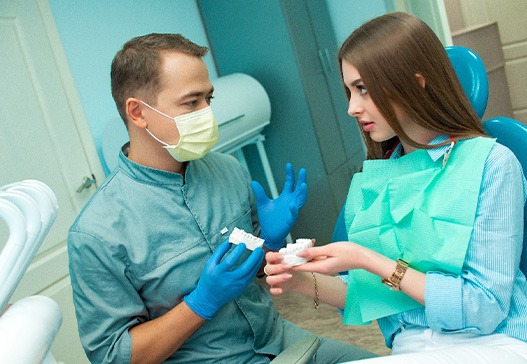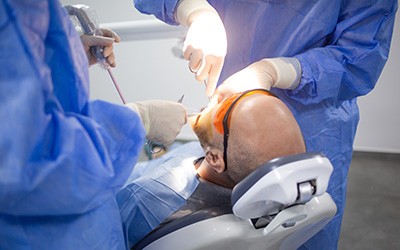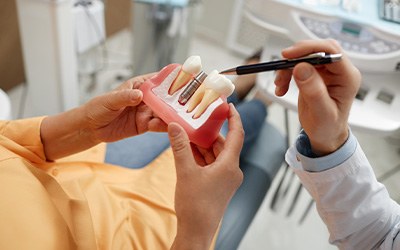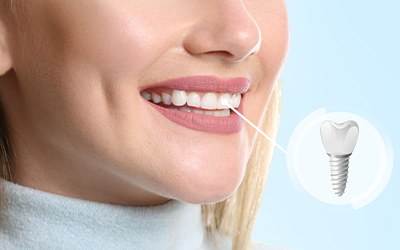Dental Implants – Warsaw, IN
Lifelike Replacement Teeth Built to Last

It can be hard to feel confident about your smile when you’re always worried about a poorly fitting denture slipping around or falling out. Luckily, there’s one type of tooth replacement that you can always count on to stay in place. Dental implants are essentially the next best thing to having your natural teeth back, and here at East Center Dental, Dr. Michael Rudolph can handle the entire treatment in-house. To schedule your consultation for lifelike tooth replacement with dental implants in Warsaw, IN, call us today!
Why Choose East Center Dental for Dental Implants?
- Start-to-Finish Dental Implant Treatment in One Location
- Detail-Oriented Dentist with 30+ Years of Experience
- iTero Goop-Free Digital Dental Impressions
What Are Dental Implants?

Dental implants are screw-shaped posts that serve as the roots for your new teeth. They’re typically made from titanium, ceramic, or zirconia, since these materials encourage the growth of new bone tissue after the post is placed in the jaw. Eventually, the implant is just as embedded in the jawbone as the roots of your natural teeth. Then, it can support any number of prosthetic teeth for many years to come.
The 4-Step Dental Implant Process

If you want a permanent, natural-looking solution for your missing teeth, dental implants are the gold standard. But what happens during the process, exactly? The procedure has four key steps, each carefully designed to ensure successful implantation and lasting results. At East Center Dental, we guide you through every stage, from the initial consultation to the final restoration. With advanced techniques and personalized care, we make your dental implant treatment seamless and stress-free. Read more below to see a breakdown of how dental implants work!
Initial Dental Implant Consultation

Your treatment begins with a detailed consultation at our Warsaw dental office. During this visit, we evaluate your oral health, review your medical history, and take several digital X-rays and 3D scans to see if dental implants are the right choice for your unique case. We’ll then discuss your treatment goals, answer any questions, and create a personalized plan tailored to you!
If necessary, preparatory treatments like bone grafting or tooth extractions will also be scheduled during this phase of treatment. This step is all about careful planning that ensures you’re set up for success.
Dental Implant Surgery

The next step is the surgical placement of your implant fixture. This procedure is done under local anesthesia or sedation for your comfort. During the surgery, the implant—a small titanium post—is carefully inserted into your jawbone to act as an artificial tooth root.
At East Center Dental, Dr. Rudolph uses advanced surgical techniques for precision and minimal discomfort. Once the fixture is placed, the area is stitched, and you’ll receive post-operative care instructions to ensure a smooth recovery. Most patients report only mild discomfort after the anesthetic wears off, so you should be able to manage with generic pain medication.
Dental Implant Osseointegration & Abutment Placement

After surgery, the implant undergoes osseointegration, a process where it fuses with your jawbone. This can take 3–6 months, but it secures the longevity of your implant as it creates a strong, stable foundation for your new tooth. Once the implant has fully integrated, the abutment—a connector piece—is placed on top with another minor procedure. The abutment extends above the gum line, providing a base for the final restoration to attach to.
Delivery of Dental Implant Restorations

The final step is attaching your custom-made dental crown, bridge, or denture to the abutment. These restorations are designed to blend seamlessly with your natural teeth in shape, size, and color, so you won’t have to worry about them looking “fake.” At our Warsaw practice, we make sure your smile looks and feels fantastic! Once your restoration is placed, you’ll enjoy a fully functional, natural-looking tooth replacement. With proper care, your dental implant can last a lifetime, giving you confidence in your smile every day!
Benefits of Dental Implants

More than 500,000 people get dental implants every year. They have quickly become one of the most popular ways to replace missing teeth. Because they are precisely placed in the jawbone, there are numerous benefits that you can experience. Here are just some of the huge differences you will notice when you get your dental implants.
Day-to-Day Benefits

Dental implants should feel perfectly natural when they have completely healed. At this point, you should be able to enjoy all of the same things that you did before losing your teeth. Here are some of the benefits that you can experience every day:
- Easy Maintenance: You take care of your dental implants the same way you care for your natural teeth. Brush, floss, rinse, and attend regular cleanings and checkups every six months.
- Increases Confidence: The way that you feel about yourself is very important. However, tooth loss can lower self-esteem. By replacing your teeth with dental implants, you can show off your smile with pride again!
- Restore Bite Force: Your bite force can be replenished by 90% or more! This is a lot more than what you can expect with dentures or dental bridges.
Health Benefits

Your health will be positively influenced when you get dental implants. Here are a few of those benefits:
- Prevents Bone Loss: Jawbone loss will eventually occur after tooth loss. Dental implants stimulate the jawbone, therefore allowing it to remain strong and healthy.
- Better General Health: Excellent dental health will have an impact on your overall health. It can even lower your risk of serious medical conditions, like diabetes and heart disease.
- Improved Dental Health: With dental implants, you are less likely to get cavities, gum disease, infections, and lose additional teeth.
Long-Term Benefits

Dental implants are a great investment for your future! Here are some of the benefits that you can experience numerous years down the road:
- Success: Dental implants have a very high success rate of over 95%. Your chances of experiencing dental implant failure are very low.
- Save Money: You don’t need to stock up on adhesives or soaking solutions. You don’t have to worry about routine repairs or replacements either!
- Long-Lasting: Dental implants can last upwards of three decades or even the rest of your life with proper maintenance.
Who Dental Implants Can Help

One of the greatest things about dental implants is that basically any healthy adult can get them, including those who are missing all of their teeth! So, if you are struggling with tooth loss and you’re interested in rebuilding your mouth with this state-of-the-art tooth-replacement option, don’t hesitate to schedule a consultation with our Warsaw dental team. If you can’t get on the phone right now, don’t worry – you can learn more about who dental implants can help by simply reading on.
Who Is a Good Candidate for Dental Implants?

If your mouth and jawbone are in good enough condition to support the dental implant, then there’s a good chance that you’ll be a candidate. If that’s not the case, then we will need to determine which preliminary treatments are needed, like gum disease therapy.
The good news is that there’s no limit to the number of teeth that dental implants can replace. So, whether you are missing one molar or you don’t have any of your natural teeth left, dental implants may be an option for you! At your consultation with Dr. Rudolph, he will recommend either a single implant, an implant bridge, or an implant denture depending on your specific dental needs and smile goals.
Missing One Tooth

Previously, replacing one tooth required a traditional dental bridge. Although this is still an option, a dental implant is preferable because it doesn’t require healthy enamel to be removed. Instead, Dr. Rudolph can simply place a single dental implant post in the gap and attach a crown on top. This solution seamlessly fills the space while leaving the rest of your dental structure untouched. Plus, with proper care, the results will last for 30+ years!
Missing Multiple Teeth

A dental bridge can be secured onto two dental crowns, but (as mentioned above) this often requires healthy enamel to be altered. The good news is that this restoration can also be anchored in place with one dental implant on one side of the gap and another one on the other. This state-of-the-art solution can also be used to replace several teeth throughout your mouth, which adds to its versatility. Since the implant is inserted into your jawbone and the restoration is custom-made to fit your face shape perfectly, no one will be able to tell which teeth are dental implants and which ones aren’t.
Missing All Teeth

Traditional dentures are held in place with a discreet metal framework or natural suction. Implant dentures, on the other hand, are held in place with four to eight dental implants. Not only does this allow us to replace an entire row of lost teeth, but it also ensures patients have a more stable and comfortable restoration. So, if you are missing one arch of teeth or you don’t have any of your natural teeth left, don’t just assume traditional dentures are your only option!
Understanding the Cost of Dental Implants

Even if you want treatment, you may worry about the cost of dental implants in Warsaw. In particular, you might fear the procedure is too expensive for your budget. That’s understandable, as restorations can get pricey at times. Still, remember that implant surgery’s cost varies by patient. As such, you can’t know your treatment estimate before getting a consultation. Plus, we at East Center Dental will do our best to ensure affordable care. If you’d like to learn more about implant pricing, keep reading or contact our office for details.
Preliminary Treatments & Dental Implant Surgery

You may need preliminary treatments before implant surgery. (For example, Dr. Rudolph may suggest gum disease therapy, tooth extraction, or bone grafts.) If so, these services would add to your overall expense. That said, these extra procedures would ensure your new smile’s long-term success. Furthermore, many dental plans partially cover them.
At the same time, surgery incurs its own cost. Your final bill will depend on where the implants are placed, what kind of sedation or anesthesia you need, etc. Fortunately, our team performs the placement in-office — you won’t have to worry about paying an outside surgeon.
The Parts of Your Dental Implant

Even the implants themselves will impact your treatment estimate. As such, you’ll want to take the following into account:
- Implant Brand: Different manufacturers make implants differently. Therefore, how much you pay depends on which brand you get.
- Implant Number: The more implants you get, the higher the treatment cost.
- Implants’ Size or Material: Longer implants are more expensive than shorter ones. Similarly, zirconia implants are pricier than titanium models.
How Dental Implants Can Save You Money

True enough, dentures and bridges have a lower initial price. However, dental implants’ one-time cost saves you more money in the long run. After all, implants don’t need replacing or adjusting every 5-10 years as dentures and bridges do. They also don’t require that you buy special pastes, cleaning solutions, or adhesives. Best of all, implants are easy to clean and don’t irritate your mouth, preventing costly problems like gum disease, tooth decay, and jawbone loss. Studies even show that good oral health lowers your risk of systemic issues and the costs of addressing them.
Does My Dental Insurance Cover Dental Implants?

In general, dental insurance doesn’t cover dental implants. Most providers consider them purely cosmetic and thus not medically necessary.
On the other hand, there are exceptions. For example, a policy might offer partial coverage for implants or preliminary treatments. For that reason, our team will review your dental plan to ensure you maximize your benefits. You can trust that we’ll deliver, as we have years of experience in this field.
Making Dental Implants Affordable

Even without insurance, there are ways to make implants affordable. Consider the following options from us at East Center Dental:
- In-House Membership Plan: For a low monthly fee, our office offers discounts on a variety of procedures — including dental implants!
- CareCredit Financing: With the third-party service CareCredit, you can pay for dental treatment with monthly, low-interest installments. That way, you could cover the cost over time instead of all at once.
Dental Implants Post-Op Instructions

Your mouth must heal for a while after dental implant surgery; it can’t recover immediately. With that said, don’t panic – we at East Center Dental are here to help! Listed below are our dental implant post-op instructions in Warsaw, which will ensure you heal smoothly and easily. Using them will let you enjoy your new prosthetic teeth without obstacles or issues! So, please keep reading or contact us to learn how to handle your dental implant aftercare.
What to Do Directly After Dental Implant Surgery

Following dental implant surgery, you mustn’t touch the forming blood clot; you’ll delay or reverse your recovery otherwise. It’s thus crucial that you stick to these rules:
- Keep your fingers and tongue away from the surgical site(s) for a few days.
- During the first 24 hours after surgery, avoid using tobacco products.
- Since suction can dislodge a blood clot, don’t use drinking straws while you recover.
Common Side Effects When Recovering from Dental Implant Placement

It’s common to face certain side effects after dental implant surgery. Once the placement is over, you’ll likely experience:
- Intermittent Bleeding – The implant site may bleed slightly after placement, so please apply gauze and light pressure as needed.
- General Discomfort – Since your surgery’s anesthesia will eventually wear off, your treatment site may ache after a while. Use store-bought pain relievers to ease any soreness.
- Facial or Gum Swelling – Your face or gums could swell during the first 72 hours after surgery. If that should happen, please apply a cold compress or ice pack.
Rest assured that the effects above are temporary; they’ll quickly fade with time. Still, please tell us if they persist in your case.
Your Diet After Dental Implant Surgery

For several days after surgery, you should stick to a soft food diet. Chewing a tough meal too soon would just dislodge your blood clot and delay your recovery.
If you need examples, great non-abrasive foods to include are:
- Scrambled Eggs
- Sweet Potatoes
- Smoothies
- Yogurt
- Mashed Potatoes
- Soft Cheese
- (Non-hot) Soup
- Pasta
- Pudding
- Ice Cream
Once you feel up to it, you’ll be ready to resume a regular diet. Just make sure you limit the crunchy and tough foods in your diet. Similarly, please don’t chew directly on the implant site(s).
Post-Op Health & Oral Hygiene

Your mouth must be cleaned daily, regardless of your recovery from implant surgery. That means you should use the following tips while you heal:
Exercise caution near the surgical site when brushing your teeth twice daily.
- Exercise caution near the surgical site when brushing your teeth twice daily.
- To keep the treatment site clean, rinse your mouth with salt water twice (or thrice) daily. Oral rinses with a prescription mouthwash would also work.
- Avoid mouthwashes with a high level of alcohol (i.e., Scope, Listerine, etc.).
What to Do After Your New Teeth Are Attached

By the time your new dental crown, bridge, or denture is attached to your implant, the treatment’s hardest part is over. The most you’ll feel during this phase of therapy is just some minor (and easily managed) gum sensitivity. In other words, you shouldn’t have any swelling, bleeding, or demanding recovery steps left. You can just enjoy your beautifully restored smile that same day!
Maintaining & Caring for Your Dental Implants

When you get dental implants, such prosthetics could keep your smile complete and healthy for a lifetime. Still, that’ll only happen if you take proper care of them! In truth, implants need regular upkeep like natural teeth do. Without it, they could fail from damage or oral infection. Thankfully, we at East Center Dental have some ways to help. Below are a few simple precautions and tips on dental implant care in Warsaw. By following them properly, you’ll surely enjoy your new, gorgeous grin for a long time.
Make Oral Hygiene a Priority

True, dental implants themselves can’t get cavities. They’re artificial, made of titanium and porcelain. Even so, they still require that you maintain good oral hygiene.
You see, the teeth and gums around your implants are still at risk. Should they suffer from a tooth infection or gum disease, your prosthetics could loosen or fail to fuse. From there, you’d have to replace them with new ones – an expensive and involved process.
Given these facts, it’s crucial that you clean your implants often. More specifically, remember to brush them twice daily, floss them once daily, and rinse them with mouthwash.
Eat a Healthy Diet

Implants let you eat a wide range of foods. After all, they restore your bite force and act similarly to natural teeth. That said, you’re better off maintaining a healthier diet.
The simple fact is that some foods don’t go well with implants. Hard items –pretzels, nuts, jawbreakers, etc. – can chip or crack them. On the other hand, sticky or sugary stuff can decay surrounding teeth and wedge between implants.
Meanwhile, a “mouth-healthy” diet benefits your implants. Dairy products like milk, yogurt, and cheese have calcium, strengthening your jawbone. Similarly, leafy green veggies have folic acid and other vitamins that help to prevent gum disease.
Break Bad Habits

If you’re not careful, bad oral habits can cause your implants to fail. Therefore, try to stop as many of them as you can.
For instance, refrain from using tobacco products. These items slow recovery from implant placement and encourage gum disease. As those effects occur, your implants are less likely to fuse correctly.
Chewing on hard objects – ice, fingernails, packaging, etc. – is also a bad idea. If you do, you’ll end up damaging your implants.
Protect Your Dental Implants

Yes, implants are durable – their titanium bases and porcelain surfaces ensure that. However, they aren’t indestructible or unbreakable. So, you’ll need to protect them from forces that might cause chips or cracks.
Your best bet is to wear a custom mouthguard. In sporting events, this tool would prevent dental injuries. As for nightly tooth-grinding, a special mouthguard for sleep could keep your implants safe.
Schedule Regular Dental Checkups

Lastly, good implant care involves regular dental checkups. Attending these visits every six months ensures your restorations work consistently.
At any given checkup, a dentist can monitor your oral health and spot issues early. Therefore, frequent ones allow a dental practice to treat problems before they threaten your implants.
Dental Implant FAQs
How Long Do Dental Implants Last?
Dental implants are one of the most permanent solutions for missing teeth, capable of lasting well over 30 years. Of course, their exact lifespan depends heavily on your oral health and lifestyle. You can help your upgraded smile’s durability by brushing twice a day along with daily flossing and rinsing with an ADA-approved mouthwash. Make sure you visit Dr. Rudolph every six months for a checkup and cleaning as well!
Does Getting Dental Implants Hurt?
Before the procedure begins, we will numb your mouth with a local anesthetic to ensure you’re completely comfortable. You’ll also most likely be sedated during your surgery which means your body’s ability to register pain will be much lower. For the first few days following dental implant placement, your mouth may feel sore and irritated. Fortunately, you can easily manage your discomfort by taking over-the-counter pain medication and using cold compresses.
How Long Does It Take to Recover from Dental Implant Surgery?
Most patients can return to their usual activities the day after surgery. However, it’s incredibly important you avoid strenuous exercise for the first 1-2 weeks as it can hinder the healing process. Although you can expect some bleeding and swelling after your procedure, it should stop within 3-4 days. While you recover, make sure you take your prescribed or over-the-counter pain medication as directed. It’s worth noting you may need up to six months for the implants to fuse with your jawbone via osseointegration.
Will People Be Able to Tell That I Have Dental Implants?
Your restorations are going to be personalized for your smile because your implant dentist in Warsaw takes impressions of your mouth to create them. Once they are placed, people shouldn’t be able to tell the difference between them and your natural teeth. The implants are secured in your jaw like tooth roots, so you won’t need to hold your jaw in an awkward way to keep them in place as you might with poorly fitting dentures. The combination of natural appearance and secure fit is unmatched!
What Should I Do If My Dental Implant Feels Loose?
If your dental implant feels loose, then you should call our Warsaw dental team ASAP. This is one of the most common signs of dental implant failure, which means that we need to intervene right away for the highest chances of saving it.
Am I Too Young to Get Dental Implants?
Obviously, infants, toddlers, and young children are not candidates for dental implants. Since it usually takes 20+ years for the jaw to fully develop, it’s typically not recommended for teens either. Of course, there are lots of factors that impact candidacy, such as gender. After all, women’s jaws typically develop faster than men’s jaws. All that to say, don’t hesitate to talk to our team about the available options. Although dental implants may not be an option now, we can restore your smile with a dental bridge or denture until they are!
Is There Anything I Shouldn’t Eat with Dental Implants?
Fortunately, dental implants expand your diet more than they restrict it. A good guideline to follow is to not eat anything that would harm your natural teeth. For example, consuming sugary treats in excess can result in serious oral health problems, like gum disease, whether you have dental implants or not. So, keep foods and drinks that are packed with sugar to a minimum. Similarly, you should be careful when eating raw nuts and other crunchy foods.
Will I Have to Take Off Work for Dental Implant Surgery?
Most likely, yes. If work is particularly hectic right now, then you can try scheduling your dental implant procedure on a Thursday or Friday afternoon so you have the whole weekend to recover. However, if your job is physically demanding, then you may need to take more than two or three days off. Remember, exercising and lifting heavy objects can divert blood from the implant site, delaying healing in the process.
Do Dental Implants Decay?
Dental implants are crafted from high-quality dental materials, not enamel. So, they don’t decay like your natural teeth do! Of course, that doesn’t mean you don’t have to brush and floss anymore. Quite the opposite since you’re still vulnerable to gum disease and your dental implants can fall out if they aren’t cared for properly. For these reasons, we recommend committing to a solid oral hygiene regimen, which starts with brushing and flossing and extends to the foods you eat and how often you get a checkup and cleaning.
Can I Get Dental Implants If I Smoke?
It’s possible! However, smokers have a higher rate of dental implant failure, so it will definitely be a discussion at your consultation. At a minimum, you need to refrain from using tobacco products for two weeks before your procedure and three months afterward. If you don’t, numerous complications can arise, negatively impacting the success of your surgery as well as your oral health.
I Need a Checkup & Cleaning I Need a Dentist for My Child I am Concerned About Bleeding Gums I Have a Cavity or Broken Tooth I am Missing One or More Teeth I Want to Enhance My Smile I Want a Straighter Smile I am Scared of the Dentist I am in Pain & Need Help I am Concerned About Sleep Apnea View Our Services
